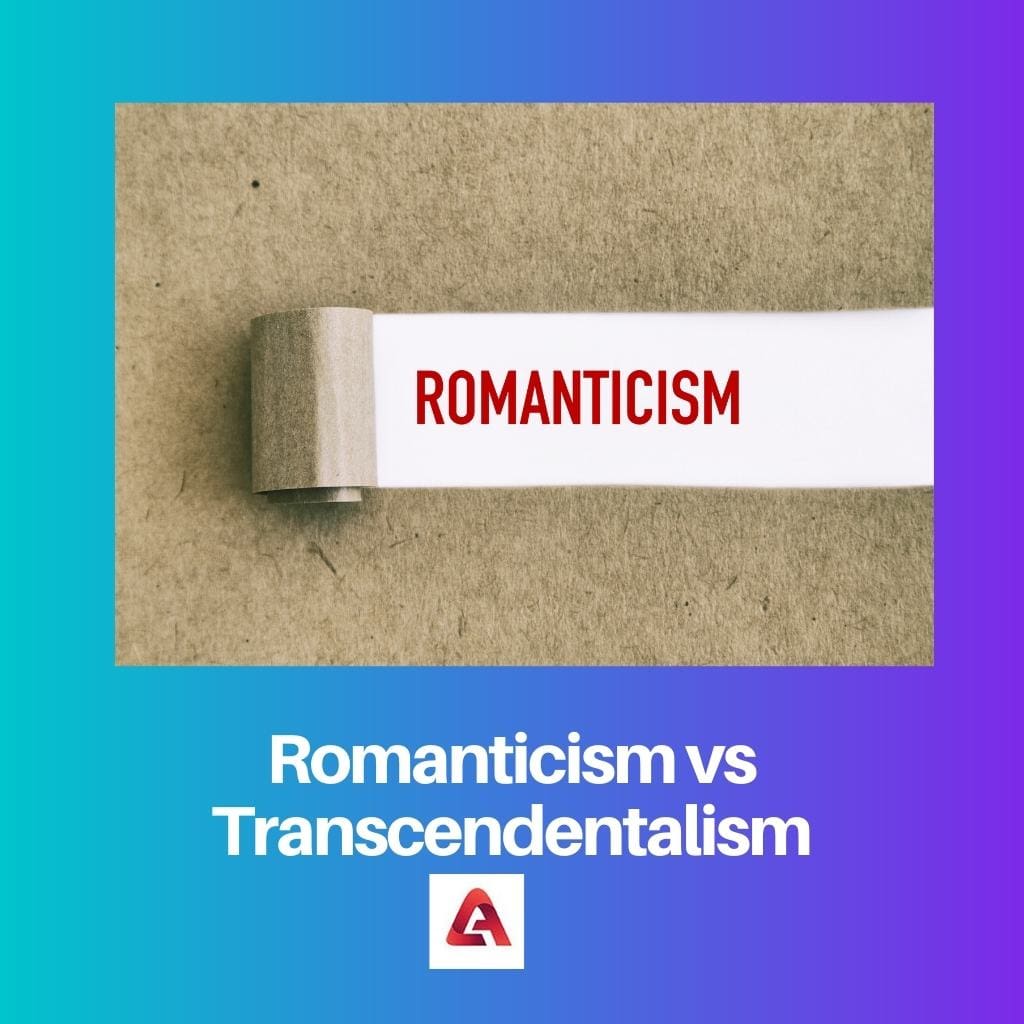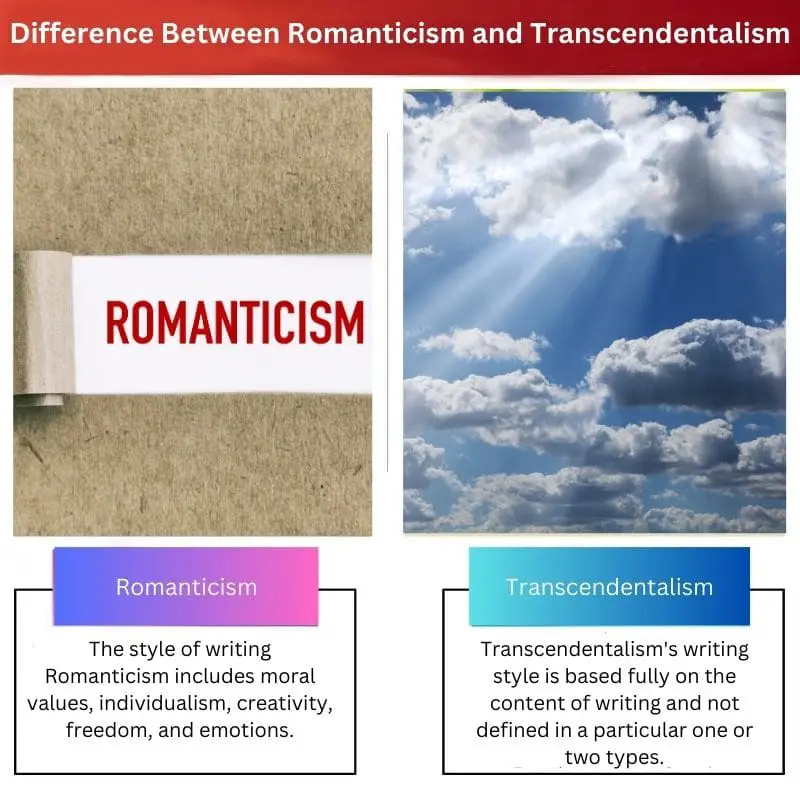Romanticism and Transcendentalism are quite similar literary movements in nature, confusing people between them. Romanticism and Transcendentalism movements started in America in 1840 and 1860 in the late 18th century.
Key Takeaways
- Romanticism emphasizes emotion, individualism, and imagination, while Transcendentalism focuses on the unity of all things and the power of the individual to transcend material reality.
- Romanticism celebrates nature, the supernatural, and the exotic, while Transcendentalism emphasizes simplicity, self-reliance, and spirituality.
- Romanticism is associated with European literature and art, while Transcendentalism is a uniquely American movement with roots in New England.
Romanticism vs. Transcendentalism
The difference between Romanticism and Transcendentalism is that Romanticism has not emphasized God much, but God is always known to be the external force when mentioned. Transcendentalism emphasizes God more and considers God as an internal light within the human body.

Comparison Table
| Parameters of Comparison | Romanticism | Transcendentalism |
|---|---|---|
| Style of Writing | The style of writing Romanticism includes moral values, individualism, creativity, freedom, and emotions. | Transcendentalism’s writing style is based fully on the content of writing and not defined in a particular one or two types. |
| Highly Dependence | Romanticism highly depends on observations collected from natural senses, feelings, and emotions. | Transcendentalism is highly dependent on guidance from inner light and intuition. |
| Start of Literary Movement | The Romanticism movement was born earlier in the 18th century, and it was at the final stage in the year 1840. | The beginning of Transcendentalism movement was started around 1834 and lasted till approximately 1860. |
| Religion | Romanticism was not much dedicated to the ideas of God. Hence, religion was meant to be worked on a personal inner basis resulting in good or evil but not blindly following the same preconceived structure of religion. | Transcendentalism was fully based on religion. They rejected religious dogma but believed that God’s presence is everywhere and hence God can be found by intuition. |
| Reactions | Romanticism was the reaction against outward appearances and objective reasoning. | Transcendentalism was the reaction against religious traditions, beliefs, and dogma, which overpowered humans. |
| Writers | Names behind Romanticism writing are Emily Dickinson, Nathaniel Hawthorne, Edgar Allen Poe, and Walt Whitman. | Names behind Transcendentalism writing are Henry David Thoreau, Margaret Fuller, and Ralph Waldo Emerson. |
What is Romanticism?
Romanticism, or Romantic Era, was an artistic, literary, intellectual, and musical movement born in Europe and initialized at the end of the 18th century.
Romanticism was worked out from 1800 to 1860 approximately. Romanticism was a reaction to the biased revolutions of industry, the rationalization of science, and even the concept of modernity.
The five characteristics of Romanticism are :
- Romanticism has an interest in the common man and childhood
- Romanticism has awe for nature
- Romanticism has strong feelings and emotions
- Romanticism celebrates individuals
- Romanticism has the importance of imagination
Famous writers in the genre of Romanticism:
- William Wordsworth
- Lord Byron
- John Keats
- William Blake
- Mary Shelley

What is Transcendentalism?
Transcendentalism was known as a philosophical movement that was initialized in the years 1820 and the year 1830.
Transcendentalism was known for the inherited goodness of people and nature, complimenting society and its religious structure with traditional values through rejecting traditional dogma.
Transcendentalism’s main motive was to enhance intuition over objective reasoning. Transcendentalism teaches that there is god’s presence everywhere, yet it should be given equal respect.
The five characteristics of Transcendentalism are:
- Transcendentalism believes in indwelling divinity in human souls
- Transcendentalism values the superiority of individuals over society
- Transcendentalism promotes thinking which is out of the box.
- Transcendentalism studies nature and counts as an inspiration for developing one’s self.
- Transcendentalism shows confidence in the universe and beliefs, whatever happens, is organic, welcoming, and inherently good.
Famous writers in the genre of Transcendentalism:
- Louise May Alcott
- Elizabeth Peabody
- Frederic Henry Hedge
- William Ellery Channing
- Christopher Pearse Cranch

Main Differences Between Romanticism and Transcendentalism
- Romanticism was highly based on feelings and emotions and introduced emotions like anxiety, depression, etc. And hence Romanticism highlights patriotism, allegiance, and loyalties. In contrast, Transcendentalism highlights the power of nature, individualism, and divinity.
- Romanticism emphasizes emotion and feelings over personal and intellectual growth, whereas Transcendentalism emphasizes inspirations beyond human perspective, normal traditions, and reasoning.
- Romanticism doesn’t heavily emphasize God, whereas Transcendentalism strongly emphasizes God and divinity and believes in miracles.
- Romanticism indicates positivity, whereas Transcendentalism indicates both good and evil as a part of personal growth.
- Romanticism was against outward appearances and objective reasoning, and Transcendentalism was against religious traditions and dogmas.

- https://www.tandfonline.com/doi/full/10.1080/10509585.2014.926047
- http://scholar.dkyobobook.co.kr/searchDetail.laf?barcode=4010023577832

I always confused romanticism and transcendentalism until now. This article has been very informative and enlightening.
I agree, this was a very detailed comparison of both movements. Great job.
The author didn’t provide enough examples of literary works from both movements. It would have been better to understand with more references.
You’re right, some examples would have improved the overall article.
I disagree, more examples would have made the article too long. The comparison was enough to understand the differences.
I found the explanation of the main differences very clear and well-structured.
Absolutely, it made the distinctions easy to identify.
I see those differences much more clearly now.
The references provided are very helpful, allowing for further exploration of the topic.
Agreed, those are great points of departure for further reading.
Yes, the references are highly valuable.
The table comparing Romanticism and Transcendentalism was a great way to illustrate the differences in a clear manner.
Absolutely, it made it so much easier to comprehend.
I was hoping for more insight into the impact of both movements on American society and literature. This was lacking.
I enjoyed the information on the main differences. It clarified many aspects for me.
Indeed. It was very well-explained.
The article was rather dry and lacked passion. It would have been better with a more engaging tone.
The comparison table was extremely helpful and succinct. It allowed for a direct comparison of key features.
I second that. It was a well-structured table.
The piece on the characteristics of Romanticism and Transcendentalism was very insightful. It provided a deeper understanding of both movements.
I enjoyed that part too, Frank. It was a great analysis.
I found the characteristics part very enlightening as well.